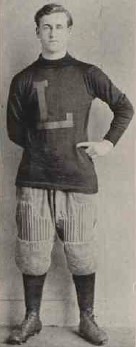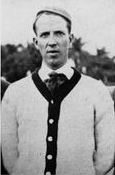LSU Pivotal Football Moments
pivotal college football moment: A decision by a coach or athletic director that changes the momentum of a program or an action by a player that changes the momentum of a game.
pivotal college football moment: A decision by a coach or athletic director that changes the momentum of a program or an action by a player that changes the momentum of a game.
They called George Ellwood Fenton "Doc" because his dad sang with traveling Indian medicine shows. He was born in Scranton PA in 1887 but began his college athletic career in Canada in 1904 at St. Michael's College where he played rugby (which was much closer to American football then than it is today). Doc later said, "I got all the fundamentals of playing rugby in Toronto. I learned how to kick on the run, and I learned how to operate in the open field." He then played football at Mansfield State Normal School back in his home state. He became the star receiver in 1906, the first year of the legal forward pass.
The first Southern university to contact Fenton was Mississippi A&M (now Mississippi State). Fred Furman, the brother of a teammate, had been hired as the football coach and tried to enlist his brother and three others, including Doc, to go with him to Starkville.
One day a well-dressed man introduced himself to Fenton after practice. "My name is Edgar Wingard. I'm the new coach at Louisiana University. How would you like to go to a Southern school?" A native of the Keystone State himself, Wingard had coached the Pittsburgh football team in '06.
Fenton Chooses LSU
His first impression of the visitor being favorable, Doc promised to consider LSU. Edgar followed up with regular letters to Fenton. Then one day in the spring of '07, Doc arrived home to find an unknown woman speaking to his mother. She turned out to be Mrs. Wingard. "As a speaker," said Doc, "his wife was just as impressive as he was. She sure impressed my mother. Before she left, I promised to go down to Baton Rouge for a visit."
So that summer, Doc headed south with another Pennsylvanian, E John Seip, whom Wingard also wanted. Fenton later recalled: "Baton Rouge was a nice little town, but I have to be honest and say the thing that really sold me was the nickel beers. We had blue laws back home, and Wingard was quick to point out they had blue laws in Starkville too."
Later, when Furman tried to prove that Fenton was illegally recruited, Doc produced the letters the new A&M coach had written to him, letters that contained "some mighty interesting offers." So the schools agreed to drop the issue. The Tigers beat the Maroons 23-11 when they met that fall in the Capital City. |
 Doc Fenton LSU Gumbo Yearbook Class of 1908  Edgar Wingard Louisiana Digital Library |
If he had stayed in the Northeast, Fenton would have set the football world on fire. But displaying his talents in the Deep South, he didn't make Walter Camp's All-American teams, which included seven halfbacks, in either '07 or '08. Future LSU president Troy Middleton: "I saw Jim Thorpe, but Doc Fenton was better."
LSU T Marshall Gandy: "Doc could do more with a football than a monkey can with a coconut. He was the greatest field general who ever donned a uniform, a fellow who could punt on the run and catch the football one-handed. Doc was the hub of our team and we were the spokes."
LSU went 23-5 in Fenton's three varsity seasons, including a 10-0 mark in 1908 that included a victory in the Bacardi Bowl in Havana, Cuba.